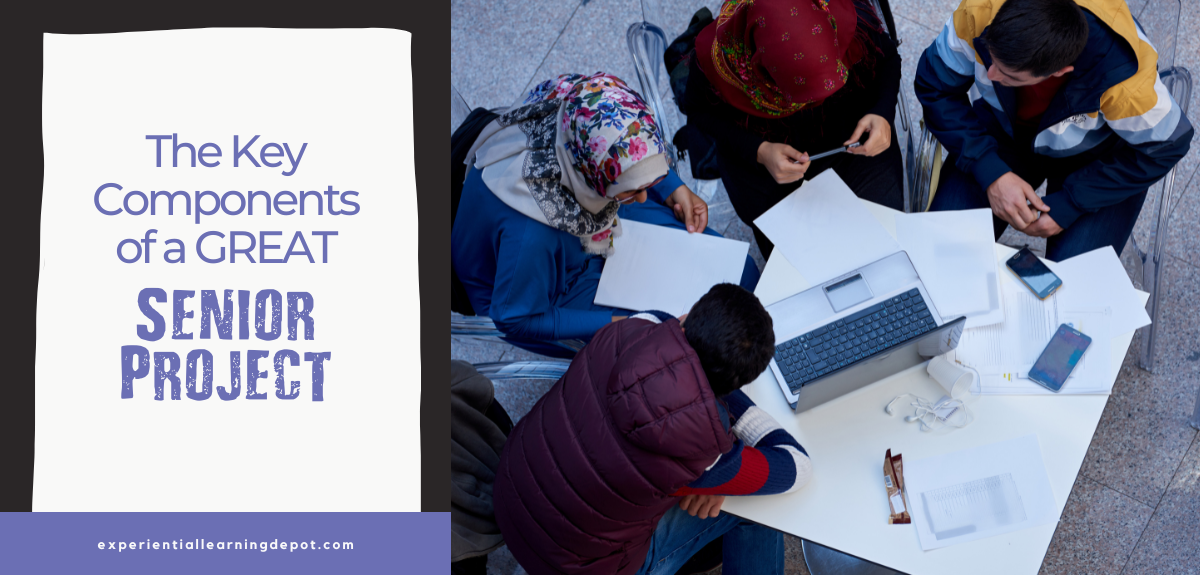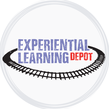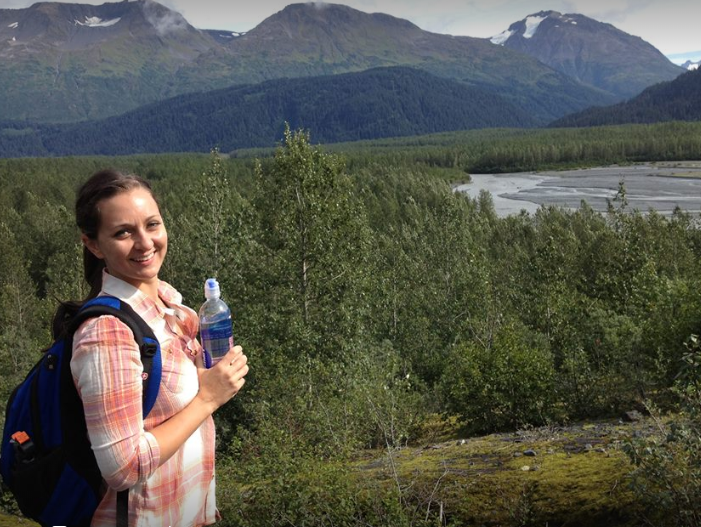|
Experiential learning resources for the innovative educator
What are some ideas for senior project components and how do those phases come together to form a comprehensive senior experience that will set your students up for life? Learn more here!
I heard the word "senior project" the first day I walked into my classroom as a first year teacher. Senior projects, although they took many different shapes over the course of my career, were highly emphasized and valued at my school.
We always implemented a senior project of some kind. The school never wavered on that, and I never questioned it because I witnessed senior projects to be one of the most amazing college and career readiness strategies for our students. You may already know the benefits of a senior experience or why it's important to implement senior projects, but aren't sure what to do next. You need ideas for senior project components or directions. This post is meant to give you some ideas for senior projects, and when these components are combined, o the result is a comprehensive senior experience that will change the lives of your students. Literally.
Over the course of ten years at the school, we tried a variety of senior project ideas or methods to ready students for life after high school from written philosophy papers, to year-long senior project based learning experiences, to life plans. Some of our seniors even made career portfolios for a state-wide career competition.
I watched how all of these experiences impacted and prepared our students for the next big step. These authentic experiences were deeply engrained in our philosophy, and thus, I was trained to prepare our students for life, not for passing tests alone. That meant helping them: 1) build 21st-century skills, 2) explore careers, and 3) develop a portfolio of authentic experiences to carry with them into the next chapter. So I combined a variety of these ideas for senior project components with my students, particularly my juniors and seniors. Our postsecondary coordinator continued to guide my students in creating life plans while I worked with them on building 21st-century skills journals, exploring career options, completing community action senior projects, and developing career portfolios through personalized, authentic learning experiences.
I have put all of these senior project ideas and components into one comprehensive senior experience resource for you to use.
You do not need this senior experience resource bundle to execute this senior project, but it will guide you and save you tons of time so that you can spend that precious time immersed in facilitating these senior experiences. For help organizing senior experiences this year, grab my free senior experience implementation spreadsheet where you can manage deadlines and project-specific task completion for each student.
Before getting into the details of the various components of my senior experience, I want to note that this experience is not meant to make students feel married to a particular career. No one is saying this is what they must to do with their lives.
Young people (and old) are always learning. My career has evolved so frequently and in so many ways, and it was important that I was encouraged to explore and be flexible with my path in life. Rather, the idea is to get kids thinking about it, exploring their options, examining who they are and what they stand for. Keep that in mind! Ideas for Senior Project Components
1. Personal Learning Plan
A personal learning plan is a document where students develop and manage learning plans for any given session. Their personal learning plan for the session is developed around the students' individual needs, interests, strengths, challenges, goals and more. My seniors (and sometimes juniors) use a different personal learning plan than my 7-10 graders. The senior-year personal learning plan is a Google Slides PLP template that is geared toward identifying career interests, examining postsecondary aspirations, making corresponding goals, and writing a personalized plan for their senior year. This resource is meant to be used in tandem with at least one of the senior project ideas below. It could be used in isolation only if your teaching style personalizes learning in general.
2. 21st-Century Skills Portfolio
Prospective employers will be looking for experience and skills when making hiring decisions. They are looking for skills in that field, yes, but they are also looking for 21st-century skills such as creativity, problem-solving, leadership, and critical thinking skills. Part of my senior experience, then, is helping students build these skills with a 21st-century skill-building portfolio. Students participate in 21st-century skill-building learning activities, then they write journal entries that reflect on these experiences and offer evidence of skills competence. The end product is a demonstration portfolio that showcases strengths in these soft skills.
3. Career Exploration Project
The next piece of my senior experience is career exploration. My students explore careers from a project-based learning approach. If you are an avid reader of this blog, you know that self-directed project-based learning is my number one experiential learning strategy. Students choose a career to explore. They then research the career, connect with professionals from that line of work, develop innovative products to demonstrate learning, and share their final products with an authentic audience. This career exploration project-based learning experience could be done in isolation from the rest of the senior experience if you are looking for a quick senior project idea. I often have my juniors do this project.
4. Community Action Senior Project
This community action senior project is an awesome experience that incorporates community, networking, leadership skills, global awareness, local community awareness, problem-solving, research, communication, collaboration, character-building and so much more. Community action projects are large-scale project-based learning experiences that take anywhere from 6 weeks to 6 months depending on the nature of the experience. Each student identifies a community issue or problem as it relates to their career interest. For example, if a student wants to go into public health as a career, they might focus their project on the stigma of mental health or lack of resources for teens with mental health issues. Students would then explore solutions, develop an action plan, and take action. Their action plan might include working with local legislators to help write and pass a bill, for example, or plan and coordinate a mental health awareness event for teens. For help facilitating community action projects, head to these blog posts: 1. Four Ways Students Can Take Action in Their Communities Today 2. How to Facilitate Community Action Projects in a Few Easy Steps 3. 10 Community Action Project Ideas
If you were to choose only one part of this senior experience, I suggest the community action senior project. It is incredibly powerful. So if you do not have an entire year to dedicate to this experience, just pull out this one.
I highly recommend grabbing my free project-based learning teacher planner to help you plan and coordinate self-directed project-based learning experiences like this community action project. This planner is digital and printable, it's interactive, and the major elements of project-based learning are included to help scaffold the experience.
5. Career Portfolio
The professional career portfolio is my favorite part of this senior experience! My career portfolio template includes a cover page, resume, career summary, philosophy statement, work samples, volunteer experiences, references and more. Students add experiences from their career exploration projects and community action projects to this portfolio. They add a variety of high school resume builders to the resume template included in the portfolio. Students also add skills and relationships developed from the authentic learning experiences to the portfolio. For example, one student might have worked closely with a local non-profit for their community action project and gained a good reference from that experience, which they would then add to their portfolio. Or that experience might have strongly influenced that student's philosophy statement. This career portfolio is a place where students can showcase their skills, assets, strengths, connections, and value when it comes to employment in their chosen career, and can be taken with them when they graduate to use, share, and modify indefinitely. It will change slightly as they go through experiences in their lives that shape their ever evolving direction in life.
If you're interested in executing this experience with your high school students, combining these ideas for senior project components, head over to my post on facilitating this year-long experience with your classroom or homeschool juniors and seniors. You can also email any time with questions!
High School Career and Skills Resources:
Senior Project Blog Posts:
Join our experiential learning Facebook group!
Did you know there is an experiential learning Facebook group? Check that out - Experiential Learning Community for K12 Teachers - and join in the discussion about experiential learning ideas! Find us on social media! Follow Experiential Learning Depot on Pinterest, Youtube, and Instagram for more on experiential education, and check out my shop for experiential learning resources. Observe. Question. Explore. Share.
0 Comments
Your comment will be posted after it is approved.
Leave a Reply. |
Blog IntentTo provide innovative educational resources for educators, parents, and students, that go beyond lecture and worksheets. AuthorSara Segar, experiential life-science educator and advisor, curriculum writer, and mother of two. Categories
All
|


















 RSS Feed
RSS Feed